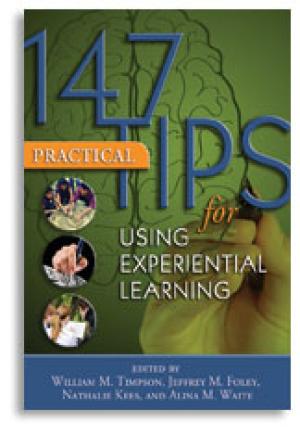Resources

The latest addition to our continuing 147 Tips series, 147 Practical Tips for Using Experiential Learning, explores the many options and strategies available in the exciting world of experiential learning. Editors Timpson, Foley, Kees, and Waite have gathered a myriad of practical and insightful tips and brought them together in a delightful and easy-to-use guide that illuminates a pivotal and rewarding subject. In this book you’ll discover valuable tips on topics including: Learning outside the classroom
Exploring alternative approaches
Tapping into the creative arts
Addressing diversity issues
Developing leadership skills Whether you are a new teacher starting out on the experiential learning journey for the first time, or a veteran educator looking to revitalize your practice for the next leg of the road, this volume will provide you with priceless pointers and examples. (From the Publisher)
From the Vanderbilt University Center for Teaching comes this deceptively brief help on case studies. The features of a good case study are described, then a series of bullets serve as an exceedingly practical "check list" for the instructor generating her first case studies for class use.
This Boston University Center for Excellence & Innovation in Teaching article describes the elements of a proper case study, its advantages for learning, guidelines for using case studies in class, and select additional online resources.
This Times Higher Education piece introduces the "case study" as a learning activity. A bit choppy in its prose, the piece nonetheless offers a solid introduction to case studies. Includes reasons why they are valuable, a framework for the activity (motivation, exploration, analysis toward deeper understanding), instructions for preparation, and the attention to the use of case studies in examinations.
Video. A lengthy You Tube video (1 hour), and dated 2008, but still relevant. Cultural anthropologist Michael Wesch discusses "media literacy" as a site of ongoing struggle and professional development for an instructor in higher education. If our students come to us unprepared for school, does that mean they are unprepared for learning? Is the problem with them, or with school? Have we taught learners the wrong things about learning?
An early You Tube mix of submissions for "The Visions of Students Today," a project by cultural anthropologist Michael Wesch. Learners express apathy and discouragement concerning their education, but also strong desire for empowering experiences of learning as creating, exploring, risking.
In this Chronicle of Higher Education (ProfHacker) piece, the author describes the discoveries arising from "Center for Teaching Excellence" workshop: specifically, regarding active learning (even with lectures), possibilities for in-class use of social media, Twitter as a means of extending collaborative learning beyond session hours, and issues of vocational training and assessment.
This graphic, with relevant links to Wikipedia, attempts to briefly describe all the established learning theories. It also maps the theories graphically 1) to one another, 2) to their key concepts and "world views," 3) to the learning theorists that developed them, and 4) to the scientific disciplines from which they arise.
A multi-part exposition of constructivism, with special attention to the roles and practices of the teacher and learner in a constructivist classroom.
A frequently-cited, critical review of an edited work, Constructivism in Education (Stephe and Gale, 1995). Jaworski offers summary and analysis of the book's chapters, each of which advocates for or critiques some form of constructivism in education.